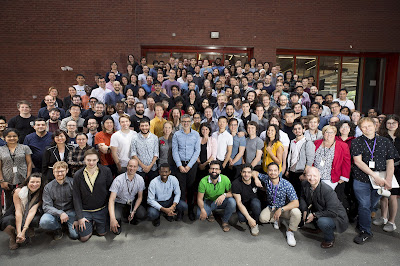This year marked a watershed moment for the Canadian artificial intelligence community with the onset of the COVID-19 pandemic. Researchers everywhere have been rolling up their sleeves to help fight the virus, putting their expertise to work for the scientific and medical communities and towards the global common good. During my 30 years of research, I have gradually learned and internalized the importance of producing science that benefits society at large. Recent efforts at Mila and across Canada highlight our collective commitment to working together to address the global challenge in front of us today and the challenges we will face in the future.
COVID-19 has changed the world forever and many industries, from healthcare to retail, will need to adapt to thrive in our “new normal.” As we look to the future and how priorities will shift, it is clear that artificial intelligence is no longer an emerging technology but a useful tool that can serve to solve world problems. Google Canada recognizes not only this opportunity but the important task at hand and I’m thrilled they have reconfirmed their support of Mila with an additional $3 million USD funding grant until 2022.
Canada’s Unique AI Ecosystem
In Canada, we are fortunate to benefit from a system that allows experts in AI to contribute to our broader social dialogue, fostering an interdisciplinarity culture and inclusive democracy. While the surge in AI knowledge and expertise in Canada has been exponential over the last decade, the trials and tribulations that we are currently facing can teach us important lessons about the responsible development of AI in the future. I believe that our attention to these issues makes our country’s AI sector unique.
Canada’s flourishing AI ecosystem is not a happenstance. This “golden age” of AI we are currently experiencing is due in great part to investment in curiosity-driven research, particularly by CIFAR, and an immigration policy that welcomes global talent. Since 2015, federal and provincial governments have invested nearly a billion dollars in our AI ecosystem, including significant efforts to attract and retain leading AI researchers in Canada, which includes Mila’s 36 active Canada CIFAR AI Chairs.
Canada was the first country to develop a national AI strategy, supporting and unifying an open collaborative mindset into its ecosystem. In 2018, Mila and Université de Montréal, with the Fonds de recherche du Québec, unveiled the Montreal Declaration for Responsible Development of Artificial Intelligence—a set of ethical guidelines recognized internationally as one of the most important initiatives for the development of responsible AI with tangible societal benefits. I believe that our forward thinking in both science and commitment to a greater common good is what attracts some of the brightest minds in AI to our leading research institutes, like AMII in Edmonton, the Vector Institute in Toronto, and Mila, right here in Montreal. The possibilities for Canadian AI research are endless and we will continue to lead the world in this area.
Mila is also benefiting from unprecedented financial support from the private sector. In 2016, Google Canada awarded Mila $4.5 million over a three-year-period. Their generous contribution as well as funding from others have helped catalyze Mila’s growth in more ways than one. Since this influx of funding, the number of faculty members has increased by 56% and we welcomed 50% more students, currently sitting at 519 - making Mila the research institute with the largest concentration of deep learning academic researchers worldwide.
On the research front, our 50 most cited publications have been referenced in scholarly literature cumulatively over 24,000 times since the start of the Google funding. Last year, Mila members produced high-impact work, including, a Nature Neuroscience paper on a deep learning framework for neuroscience, a Nature Methods paper introducing Deep Learning methods to single cell data exploration, including applications in characterizing immune response to dengue viral infections, a paper on Recurrent Independent Mechanisms, and the first known fully differentiable SLAM system.
AI: Must Benefit All
Canadian AI innovations are being developed to help visualize climate change and raise social awareness, to power self-driving cars, and to improve healthcare outcomes. One of our biggest COVID-19 projects, LambdaZero, a deep reinforcement learning system, allows for the rapid evaluation of billions of candidate molecules, making it possible to progressively modify the molecular structure by adding or removing building blocks to discover new molecular structures capable of binding to a target protein.
The development of responsible AI that will benefit everyone is, and will always be, at the heart of everything Mila does. And not just here in Canada, we’re playing a leadership role globally, as members and leaders of the OECD Global Partnership on AI. We remain humble and accept that AI as a scientific discipline is still very much in its infancy and it's critical that academics, research institutes as well as the private and public sectors work together to help steer our society and technologists in the responsible development of AI that benefits everyone. We need to accept the limits of our knowledge and continue to collaborate with experts from all fields.
Ongoing support and established trust from the federal and provincial governments, and from the main industry players like Google, is the reason why Mila—and the entire Canadian ecosystem—is able to continue to push boundaries and maintain scientific leadership in the development of innovative approaches to machine learning for AI. Google Canada’s generous support, and our pledge toward Mila’s mission, further solidifies Mila and Google’s longstanding mutual commitment to continue to develop AI for the benefit of everyone.
